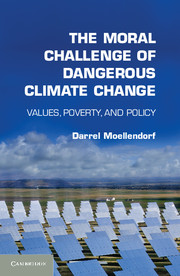Book contents
- Frontmatter
- Dedication
- Contents
- Acknowledgments
- Introduction
- 1 Danger, Poverty, and Human Dignity
- 2 The Value of Biodiversity
- 3 Risks, Uncertainties, and Precaution
- 4 Discounting the Future and the Morality in Climate Change Economics
- 5 The Right to Sustainable Development
- 6 Responsibility and Climate Change Policy
- 7 Urgency and Policy
- Afterword Frankenstorms
- Appendix A The Antipoverty Principle and the Non-Identity Problem
- Appendix B Climate Change and the Human Rights of Future Persons: Assessing Four Philosophical Challenges
- Appendix C The Right to Sustainable Development versus International Paretianism
- Appendix D Declaration on Climate Justice
- Bibliography
- Index
- References
7 - Urgency and Policy
Published online by Cambridge University Press: 05 June 2014
- Frontmatter
- Dedication
- Contents
- Acknowledgments
- Introduction
- 1 Danger, Poverty, and Human Dignity
- 2 The Value of Biodiversity
- 3 Risks, Uncertainties, and Precaution
- 4 Discounting the Future and the Morality in Climate Change Economics
- 5 The Right to Sustainable Development
- 6 Responsibility and Climate Change Policy
- 7 Urgency and Policy
- Afterword Frankenstorms
- Appendix A The Antipoverty Principle and the Non-Identity Problem
- Appendix B Climate Change and the Human Rights of Future Persons: Assessing Four Philosophical Challenges
- Appendix C The Right to Sustainable Development versus International Paretianism
- Appendix D Declaration on Climate Justice
- Bibliography
- Index
- References
Summary
“Human progress is neither automatic nor inevitable. We are faced now with the fact that tomorrow is today. We are confronted with the fierce urgency of now. In this unfolding conundrum of life and history there is such a thing as being too late…We may cry out desperately for time to pause in her passage, but time is deaf to every plea and rushes on. Over the bleached bones and jumbled residues of numerous civilizations are written the pathetic words: Too late.”
– Martin Luther King, Jr.The warming limit of 2°C has been widely endorsed. The European Union and several prominent international NGOs, including Oxfam and Christian Aid, had advocated the limit for several years before the sixteenth Conference of the Parties (COP 16) to the UNFCCC formally adopted it in Cancun in 2010. The temperature goal is, however, to a large extent arbitrary. Because of cascading uncertainties associated with various feedbacks in the climate system, we are unable to predict if dire consequences owing to warming might befall us well before an equilibrium warming of 2°C. Moreover, whether it is reasonable for least-developed and developing countries to accept a mitigation plan designed to keep warming within that temperature target depends on whether the plan lays costs on them that are likely to prolong or deepen poverty by raising their energy costs. But because it seems possible to limit the warming to 2°C in a manner that would prevent heaping costs on the least-developed and developing countries, and because of the projected economic costs of trying to limit warming at a lower temperature, the 2°C limit has broad credibility. Despite this credibility, international negotiations have so far failed to produce an agreement that would limit emissions of greenhouse gases sufficiently to have a good chance of achieving the warming limit.
- Type
- Chapter
- Information
- The Moral Challenge of Dangerous Climate ChangeValues, Poverty, and Policy, pp. 181 - 210Publisher: Cambridge University PressPrint publication year: 2014



